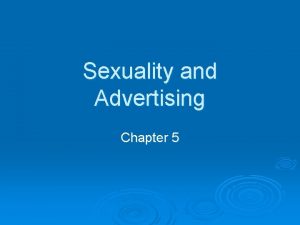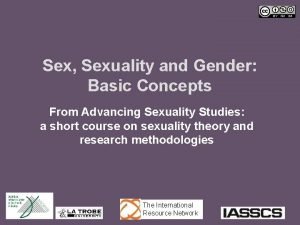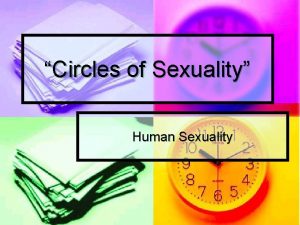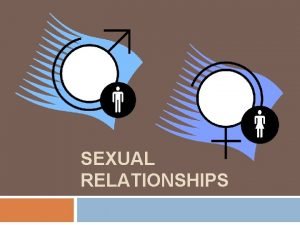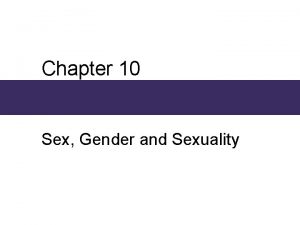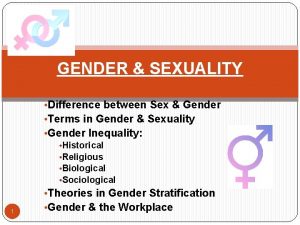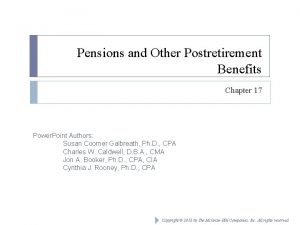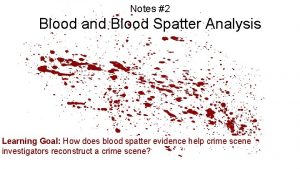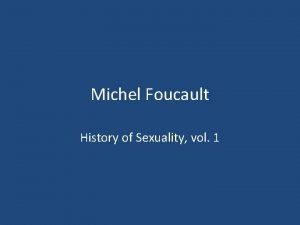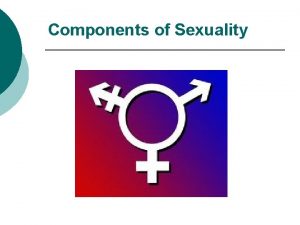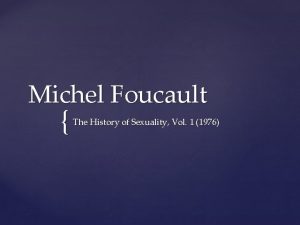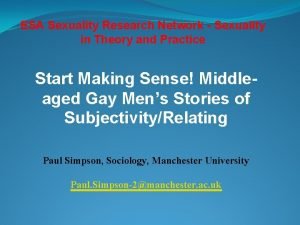Michel Foucaults The History of Sexuality Originally projected














![Martin Heideggar and Techne • As famed—and controversial—German philosopher Martin Heideggar once wrote: “[t]here Martin Heideggar and Techne • As famed—and controversial—German philosopher Martin Heideggar once wrote: “[t]here](https://slidetodoc.com/presentation_image/1b14a650df20bdb048635114b83f597b/image-15.jpg)





- Slides: 20


Michel Foucault’s The History of Sexuality Originally projected as six volumes, cut short by his untimely death from complications of HIV-AIDS Volume I: La volonté de savoir (1976); translated into English in 1978 as The History of Sexuality: An Introduction. Volume II: L'usage des plaisirs (1984); translated into English in 1985 as The Use of Pleasure. Volume III: Le souci de soi (1984); translated into English in 1986 as The Care of the Self. Volume IV: Les aveux de la chair (incomplete; unpublished); would be translated as The Confessions of the Flesh.

Other Major Works by Foucault • Folie et déraison: Histoire de la folie à l'âge classique (1961); translated, abridged version: Madness and Civilization (1964); complete version: The History of Madness (2006). • Naissance de la clinique: une archéologie du regard médical (1963); translated as The Birth of the Clinic: An Archaeology of Medical Perception (1973). • Les Mots et les choses. Une archéologie des sciences humaines (1966); translated as The Order of Things: An Archaeology of the Human Sciences (1970). • Surveiller et punir: Naissance de la prison (1975); translated as Discipline and Punish: The Birth of the Prison (1977).

Foucault’s summary of the dominant “story” about sex and sexuality in the Modern West • “Sexuality was carefully confined; it moved into the home. The conjugal family took custody of it and absorbed it into the serious function of reproduction. On the subject of sex, silence became the rule. The legitimate [meaning married] and procreative couple laid down the lay. The couple imposed itself as model, enforced the norm, safeguarded the truth, and reserved the right to speak while retaining the principle of secrecy. A single locus of sexuality was acknowledged in social space as well as at the heart of every household, but it was a utilitarian and fertile one: the parent’s bedroom” (3).

Foucault’s stated objective in questioning and reformulating the dominant “story” about sex and sexuality in the Modern West • “Briefly, my aim is to examine the case of a society which has been loudly castigating itself for its hypocrisy for more than a century, which speaks verbosely of its own silence, takes great pains to relate in detail the things it does not say, denounces the powers it exercises, and promises to liberate itself from the very laws that have made it function. […] The question I would like to pose is not, Why are we repressed? but rather, Why do we say, with so much passion and so much resentment against our most recent past, against our present, and against ourselves, that we are repressed” (8)

Metacriticism or Metacritique • The criticism of criticism; the examination of the principles, methods, and terms of criticism either in general (as in critical theory) or in the study of particular critical debates • Criticism, Critique: the analysis and judgment of the merits and faults of a literary or artistic work (often used negatively, as in the expression of disapproval of someone or something based on perceived faults or mistakes; from “critic, ” 1580 s, "one who passes judgment, " from Medieval French critique (14 c. ), from Latin criticus "a judge, literary critic, " from Greek kritikos "able to make judgments, " from krinein "to separate, decide, ” related to Greek kritikē tekhnē ‘critical art. ’

Hypocrisy • Noun; the practice of claiming to have moral standards or beliefs to which one's own behavior does not conform; pretense; from Old French ypocrisie, via ecclesiastical or church Latin, from Greek hupokrisis ‘acting of a theatrical part, ’ from hupokrinesthai ‘play a part, pretend, ’ from hupo ‘under’ + krinein ‘decide, judge. ’ Hypocrisy usually implies a gap or difference between what one says and what one does.

We ‘Other’ Victorians • Phrase from Stephen Marcus’ book The Other Victorians: a Study of Sexuality and Pornography in Mid-Nineteenth-Century England (1966) • The Victorians: 1) of or relating to the reign of Victoria, queen of Great Britain and Ireland 1837– 1901 and empress of India 1876– 1901; 2) of or relating to the attitudes and values of this period, regarded as characterized by a stifling and prudish moral earnestness. (prudish: a person who is or claims to be easily shocked by matters relating to sex or nudity)

The Repressive Hypothesis • REPRESSIVE, adjective; “repression, ” noun, from the verb “to repress”: 1) to subdue someone or something by force 2) to restrain or prevent (the expression of a feeling); 3) to suppress (a thought, feeling, or desire) in oneself so that it becomes or remains unconscious; 4) to inhibit the natural development or self-expression of someone or something; from Latin repress- ‘pressed back, checked, ’ from the verb reprimere, from re- ‘back’ + premere ‘to press • CONTRAST: EXPRESSION, TO EXPRESS • HYPOTHESIS: a supposition or proposed explanation made on the basis of limited evidence as a starting point for further investigation; from late Latin and, earlier, from Greek hupothesis ‘foundation, ’ from hupo ‘under’ + thesis ‘placing. ’

The Incitement to Discourse • INCITEMENT, noun, from the verb “to incite”: 1) to encourage or stir up; 2) to urge or persuade someone (usually, but not always, to act in a violent or unlawful way): he incited loyal subjects to rebellion. • DISCOURSE, noun: 1) written or spoken communication or debate; 2) a formal discussion of a topic in speech or writing; 3) (old) the process of reasoning; from Old French discours, from Latin discursus ‘running to and fro’ (in medieval Latin ‘argument’ ), from the verb discurrere, from dis- ‘away’ + currere ‘to run’ ; the verb influenced by French discourir.

The Perverse Implantation • PERVERSE, adjective: 1) showing a deliberate and obstinate desire to behave in a way that is unreasonable or unacceptable, often in spite of the consequences; 2) contrary to the accepted or expected standard or practice; 3) characterized by sexually abnormal and socially unacceptable practices or tendencies; 4) having been corrupted or distorted from its original course, meaning, or state; from Old French pervertir, from Latin pervertere, from per- ‘thoroughly, to ill effect’ + vertere ‘to turn. ’ • IMPLANTATION, noun, from verb “to implant”: 1) to insert or fix tissue or an artificial object in a person's body, especially by surgery; 2) (figurative) to establish or fix an idea in a person's mind; from late Latin implantare ‘engraft, ’ from Latin in- ‘into’ + plantare ‘to plant. ’

Scientia sexualis • scientia sexualis, literally “sexual science, ” in reference to Western scientific discourse on sex and sexuality focused on seeking and telling the truth through supposedly “rationalized” confession in which, for instance, the psychologists takes the place of the priest (sexology, psychoanalysis, biology, medicine, and ); the aim of “sexual science” until recently has largely been to rationalize or justify normative sexual "morality. ” • Foucault contrasts it with a vaguely Eastern “ars erotica” or “erotic arts” (from Eros, the god of love) focused on seeking and telling the truth through pleasure

Transformation into Discourse • TRANSFORMATION, indicates something IN PROCESS, something DYNAMIC (which is why I’ve been referring to a “mutually reinforcing dynamic”), something ONGOING, a movement across, or change in form (as in trans-form”) something, in short, never fixed or final. After all, Foucault is interested in history, and while history surely engages what is old, constant, reiterated, maintained (as in traditions, customs, laws, norms, etc. ), history also surely engages what is new, variable, displaced, altered. • Interestingly, the very word DISCOURSE—basically “language”—already implies a transformation, for it comes from the Latin, discursis, meaning ‘running to and fro’ (in medieval Latin ‘argument’), from the verb discurrere, from dis- ‘away’ + currere ‘to run’.

Technologies of Power • TECHNOLOGY, does not just mean “the application of scientific knowledge for practical purposes, esp. in industry, ” or the “machinery and equipment developed from such scientific knowledge, ” but rather, and even mainly, a systematic treatment, a more or less formalized practice, an “art, ” in the larger sense of the word. “Technology” comes the from Greek tekhnologia, meaning ‘systematic treatment, ’ but its root comes from tekhnē, meaning ‘art, craft’ + -logia, meaning “word” and, by extension, “knowledge”). Although there is a tendency to associate technology with the present and the future, with industrialization and post-industrialization, with mechanization, modernization, and so on, the sense of the word, in the West, is much older. • POWER: 1) the ability to do something or act in a particular way, esp. as a faculty or quality; 2) the capacity or ability to direct or influence the behavior of others or the course of events; 3) physical strength and force exerted by something or someone; 4) energy that is produced by mechanical, electrical, or other means and used to operate a device.
![Martin Heideggar and Techne As famedand controversialGerman philosopher Martin Heideggar once wrote there Martin Heideggar and Techne • As famed—and controversial—German philosopher Martin Heideggar once wrote: “[t]here](https://slidetodoc.com/presentation_image/1b14a650df20bdb048635114b83f597b/image-15.jpg)
Martin Heideggar and Techne • As famed—and controversial—German philosopher Martin Heideggar once wrote: “[t]here was a time when it was not technology alone that bore the name techne. Once that revealing that brings forth truth into the splendor of radiant appearing also was called techne. Once there was a time when the bringing-forth of the true into the beautiful was called techne. And the poiesis of the fine arts also was called techne” (34). Heidegger’s rhetoric is both lyrical and nostalgia, but hopefully the main point is clear enough: techne is not an exclusively “modern” phenomenon but an age-old practice, an art, a skill or ability, “a way of carrying out a particular task, especially the execution or performance of an artistic work or a scientific procedure, ” which is usually designated by the word “technique. ”

Technologies of Power • “Technologies of power” might be understood, then, as any of the many techniques, arts, skills, practices, or ways that power is exercised, maintained, shifted, expanded, consolidated, diffused, modified, and so on.

Will to Knowledge • WILL designates “the faculty by which a person decides on and initiates action, ” “a deliberate or fixed desire or intention, ” and “control deliberately exerted to do something or to restrain one’s own impulses. ” But along with decision, action, deliberation, desire, intention, and control, it also suggests something “subjective, ” something that “resides” in the human subject—if not indeed all animate matter (as in the will to survive) rather than in inanimate objects (to speak of the “will of the stone” is to confer an animate quality to it, to “animate” it, though the stone, properly speaking has no “will” as such).

Will to Knowledge • Foucault’s phrase, the WILL TO KNOWLEDGE, is critical for The History of Sexuality, whose original title, in French, is La volonté de savoir, that is to say, The Will to Knowledge. The title alludes to a major influence on Foucault’s work: that of the radical German philosopher Friedrich Nietzsche, famous for proclaiming that “God is dead” and for conceiving life in terms of a “will to power” by which “higher individuals” or “supermen” (more assertive, more daring, though not necessarily stronger physically) mark and direct the course— and discourse—of human history. Nietszche’s book, The Will to Power, thus informs Foucault’s book; by moving from “the will to power” to “the will to knowledge, ” Foucault is more clearly signaling the ways that knowledge (in contrast to brute force) and ideas (in contrast to weapons) shape human history.

Friedrich Nietzsche (1844 -1900), German Philosopher; radically questioned the value and objectivity of truth; proclaimed the “death of God, ” and formulated the “will to power"

Herbert Marcuse (1898 -1979); “Repressive Tolerance” (1965) • Criticism of Western liberal democracies that argues that genuine tolerance does not tolerate support for repression, since doing so ensures that marginalized voices will remain unheard. • "Surely, no government can be expected to foster its own subversion, but in a democracy such a right is vested in the people (i. e. in the majority of the people). This means that the ways should not be blocked on which a subversive majority could develop, and if they are blocked by organized repression and indoctrination, their reopening may require apparently undemocratic means. They would include the withdrawal of toleration of speech and assembly from groups and movements which promote aggressive policies, armament, chauvinism, discrimination on the grounds of race and religion, or which oppose the extension of public services, social security, medical care, etc”
 Projected and non projected aids
Projected and non projected aids Sexuality in advertising
Sexuality in advertising Definition of sexuality
Definition of sexuality Pretest: growth, development, and sexuality
Pretest: growth, development, and sexuality Awareness, acceptance, and comfort with one’s own body.
Awareness, acceptance, and comfort with one’s own body. Definition of sexuality
Definition of sexuality Definition of sexuality
Definition of sexuality Which illustrates an emotional aspect of teen sexuality?
Which illustrates an emotional aspect of teen sexuality? Peer sexuality support programme
Peer sexuality support programme Chapter 10 sex gender and sexuality
Chapter 10 sex gender and sexuality Base of uterus
Base of uterus Sexuality spectrum
Sexuality spectrum Sex
Sex Sex gender and sexuality
Sex gender and sexuality Risk projection
Risk projection Projected benefit obligation
Projected benefit obligation Arterial spurt pattern
Arterial spurt pattern Projected maxilla
Projected maxilla Projected cognitive similarity is the tendency to
Projected cognitive similarity is the tendency to Projected benefit obligation
Projected benefit obligation 5sin30degrees
5sin30degrees

